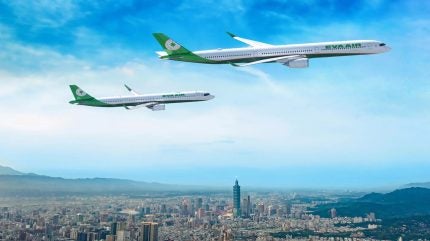
Taiwanese airline EVA Air has confirmed a firm order for six long-range A350-1000 aircraft and three single-aisle A321neo aircraft, finalising a commitment initially announced in March 2025.
This latest order increases EVA Air’s backlog to a total of 24 A350-1000s and 18 A321neo aircraft awaiting delivery.
The A350 is claimed to be the world’s most modern widebody aircraft, setting new benchmarks for intercontinental travel.
It boasts the longest range capability of any commercial airliner currently in production, with the ability to fly up to 9,700nm (18,000km) non-stop.
The aircraft is powered by the latest generation of Rolls-Royce engines, achieving a 25% reduction in fuel consumption compared to previous generation models, alongside a similar decrease in carbon emissions.
In line with industry sustainability efforts, the A350 can operate with up to 50% sustainable aviation fuel (SAF), with Airbus aiming for its aircraft to be capable of using 100% SAF by 2030.
The A350 Family has garnered over 1,360 orders from 60 customers globally, with more than 640 aircraft currently in service across 38 operators, primarily on long-haul routes.
EVA Air president Clay Sun said: “The new additions to our fleet reaffirm our commitment to sustainable aviation and delivering an exceptional travel experience.
“Both the A350-1000 and A321neo set a high standard in their respective categories, offering remarkable efficiency and comfort to our passengers.”
The A321neo, part of the A320neo Family, features the latest technologies, including new generation engines, Sharklets, and cabin efficiency enhancements, collectively delivering a 20% improvement in fuel savings.
Since its launch in 2016, the A321neo has received over 6,800 orders from more than 90 customers, capturing over 80% of the market share in its category.
Airbus commercial aircraft business sales EVP Benoit de Saint-Exupery said: “EVA Air’s new orders underscore the enduring appeal of the A350-1000 Long Range Leader as the benchmark for intercontinental operations, and the A321neo as a leader in regional efficiency.”
Last month, Airbus partnered with Japan Airlines, Nippon Paper Industries, Sumitomo Corporation, and Green Earth Institute to produce sustainable aviation fuel (SAF).
This collaboration aims to support a low-carbon society and help the aviation industry reach net-zero carbon emissions by 2050, using bioethanol sourced from domestic wood.



